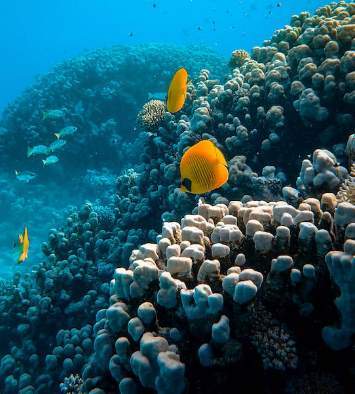What is Marine Biology?
Marine biology is the scientific study of marine organisms, behaviours, and environmental interactions. It is an interdisciplinary field incorporating knowledge and techniques from biology, chemistry, geology, physics, and other sciences. Marine biologists study a wide range of organisms, from microscopic phytoplankton to large whales, as well as the physical and chemical factors that shape marine ecosystems.
Scopes of Marine Biology
The scope of marine biology is vast and includes many sub-disciplines, such as marine ecology, marine conservation, marine geology, and marine biotechnology. Some of the specific areas of study within marine biology include the ecology of coral reefs, the behaviour of marine mammals, the biogeography of marine organisms, and the impact of human activities on the oceans.
Marine Biology, is it a good higher education option?
Higher education in marine biology typically involves obtaining a bachelor’s degree in a related field, such as biology, oceanography, or environmental science. Some universities also offer specific undergraduate majors in marine biology. After completing an undergraduate degree, students can pursue graduate studies in marine biology, leading to a master’s or doctorate degree.
Marine Biology: Scholarships available in US universities
There are a number of scholarships available for students pursuing higher education in marine biology in the United States. Some universities, government agencies, and non-profit organizations offer scholarships specifically for marine biology students. Additionally, students may be able to find scholarships through scientific societies and professional organizations related to marine biology.
Several universities in the United States offer marine biology programs at the undergraduate and graduate levels. Some of the top universities in the United States that offer marine biology programs include:
Marine Biology courses offered by US universities
Scripps Institution of Oceanography at the University of California, San Diego
Woods Hole Oceanographic Institution
University of Miami
University of California, Santa Cruz
College of Charleston
University of Maine
Northeastern University
Boston University
University of Hawaii at Manoa
University of Alaska Fairbanks
These universities have marine solid biology programs and well-equipped research facilities, including access to research vessels and marine labs. Many of these universities also have strong connections to government agencies and non-profit organizations involved in marine research and conservation.
Marine Biology: Why this course is so important nowadays!
Marine biology is a diverse and exciting field that explores the organisms and processes that shape the world’s oceans. Marine biologists study a wide range of organisms and ecosystems and use various techniques and technologies to gain a deeper understanding of the ocean. Higher education in marine biology typically involves obtaining a bachelor’s degree, followed by graduate studies leading to a master’s or doctorate degree. Several scholarships are available for students pursuing higher education in marine biology in the United States. Many universities across the country offer marine biology programs at the undergraduate and graduate levels.
Marine biology is a rapidly growing field as the importance of understanding and conserving the oceans becomes increasingly apparent. Climate change, pollution, overfishing, and loss of biodiversity are just a few of the pressing issues facing the oceans today, and marine biologists play a crucial role in addressing these challenges.
Marine Biology and Conservation of Marine Life
One of the most pressing concerns for marine biologists is marine life conservation. This includes protecting endangered species, restoring damaged ecosystems, and implementing sustainable management practices for commercial and recreational fish populations. Marine biologists also play a key role in monitoring and assessing the impacts of human activities on the oceans, such as oil spills, pollution, and climate change.
Marine biotechnology is another area of marine biology that is expanding rapidly. Marine organisms, especially microorganisms, have unique properties and biochemistry that can be used for various applications such as bioremediation, drug discovery, and the production of bioplastics and biofuels. Marine biotechnology also provides new tools and techniques to study the ocean, such as remote sensing and autonomous underwater vehicles.
Marine Geology
Marine geology and geophysics are also integral parts of marine biology. Marine geologists study the geology of the ocean floor and coastal zones, including the formation and evolution of underwater mountains, canyons, and other features. Marine geophysicists study the physical properties of the ocean, such as its temperature, salinity, and currents, and how they affect ocean circulation and climate.
Marine Ecotourism
Marine ecotourism is also a rapidly growing field in marine biology. This type of tourism involves visiting marine ecosystems and wildlife, such as coral reefs, mangroves, and whales. It can provide economic benefits to local communities while raising awareness about the importance of marine conservation. Marine ecotourism also plays a role in educating the public about marine biology and conservation.
Marine Biology and Career Opportunities
In terms of career opportunities, marine biologists can pursue a wide range of careers in academia, government, industry, and non-profit organizations. Some marine biologists work as researchers, studying marine organisms’ and ecosystems’ biology and ecology. Others may work as conservation biologists, managing and protecting marine protected areas, or as policy advisors, helping to shape laws and regulations related to the oceans. Marine biologists can also work in the industry of aquaculture, fisheries, or marine biotechnology.
In conclusion, marine biology is a diverse and dynamic field that is essential for understanding and conserving the oceans. The field encompasses a wide range of sub-disciplines and career opportunities. It is a challenging but rewarding field that offers the chance to make a real difference in the oceans’ health and the planet’s well-being. With the rise of ocean conservation and the growing demand for marine biologists, pursuing a career in marine biology can be a fulfilling and impactful choice.
It is worth noting that some universities in the USA also have interdisciplinary marine biology programs, including marine ecology, oceanography, environmental science, marine policy, marine geology, marine chemistry, marine geophysics, marine biotechnology and marine ecotourism. These programs are more comprehensive and are more versatile in terms of career opportunities.
